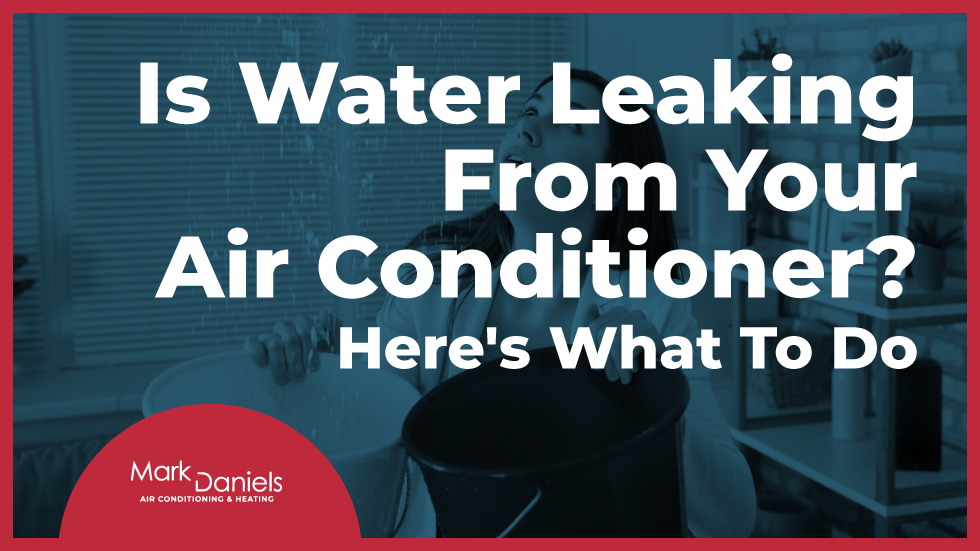Licensed | Bonded | Insured

Is Your AC Leaking Water? Here’s What To Do
Did you notice that your air conditioning unit has water leaking through?
One of the most annoying and common AC problems is an air conditioner leaking.
If left unchecked, the water leaks may cause major health and water damages.
The water will seep through your floor and continue to your ceilings and walls.
Once you notice dripping water or moisture around your unit, you need to read on.
In this guide, we’ll answer why is your AC leaking water and what you can do.
Continue reading to learn more about your AC and how you can repair or prevent water leaks.
Why Is Your AC Leaking Water?
Are you wondering, “why is my air conditioner leaking?”
It’s important for homeowners like you to know what’s wrong with your AC.
With enough knowledge, you can narrow down the reasons for your AC leaking water.
Here are some of the most common reasons why your air conditioning is leaking water:
- Blocked condensate drain line
- Damaged overflow pan
- Dirty or rusted evaporator coil
- Air filter leaks
- Low refrigerant
- Inaccurate installation
Take the time to take a look at any damages or cracks in your air conditioning unit.
You can also contact a professional to take a look at your unit and make the necessary changes.
If you live in Arizona, take a look at our guide on how to find the best local HVAC company for you.
How to Fix A Leaking Air Conditioner
Don’t despair if you find any leaks in your air conditioners.
There are a few ways you can fix and maintain your air conditioning. Here are some tips and steps you need to follow:
Regularly Change the Air Filters
One of the best precautions to ensure that the AC stops leaking water is to replace your air filters.
Getting new air filters is more cost-efficient compared to buying a new unit. They also come in as a two-in-one pack, meaning they’re more affordable to purchase.
Changing the air filters is the easiest way to clean and remove any dust or debris.
Keeping the airways clean decreases the risk of damage and promotes clearer air.
You need to change your filter every one to three months consistently.
However, living in hot areas means that you need to change the filters more than usual.
Hot weather calls for plenty of dust, meaning you need to change them every month.
A good way to minimize the dust is to keep the vent away from debris.
It should be facing away from furniture to help your air filters.
Dust and Clean the Condensate Drain
The condenser drain sucks the hot air away from your room, cools it, then releases the cool air.
While the hot air sucked by the condenser will become water.
The water then gets drained through the condensate pipe and drain.
One reason why the drain can get clogged is due to the overflowing water from the drain pan.
Another reason is the dirt or debris getting stuck in the pipe.
Start by shutting down and unplugging the AC unit.
Open the access panel to find the drain line. Look for the PVC cap which covers the drain line to check if there’s any debris from the inside.
Grab a long and thin wire brush to scrub the condensate drain line.
With little to no effort, loose gunk will come out of the pipe’s sides.
When you get the blockage out, run a test by running water into it. I
f it comes out fast, then you can put the pipe back into the unit.
Another alternative is to pour a distilled vinegar solution into the pipes.
Let it stay there for about an hour to remove stubborn dust and rust.
Use clean water to flush out the condensate drain pipe and place it back into the unit.
Find the Right Drain Pan
As mentioned earlier, replacement is the cheapest and easiest way to remove cracked or rusted parts.
However, not all drain pans fit into a certain air conditioning unit.
A common reason for an air conditioner leaking water is the wrong-sized drain pans.
Drain pans need to be a perfect size for your AC for it to function properly.
If the drain pan is too big, the water will spill out due to its awkward angle.
When it’s too small, the drain pan can’t catch the drippings from the sides.
Before replacing your drain pan, you have to get the measurements.
Unscrew your AC’s access panel to find the condensate drain pan.
Make sure you check and clean the drain pan every year.
Avoid Overworking the AC
Living in a place with constant hot weather can leave you using your AC every minute of every day.
However, doing this can lessen the life span of your AC.
It can also damage your air conditioning in the long run, leaving your AC unit leaking water.
Leaving your AC to cool the air during intense heat can damage the AC’s coils.
Remember that the more heat it takes, the more the refrigerant works. It can damage and put plenty of strain on the refrigerant and overall AC.
The best way to prevent overworking your AC is by setting it to the right temperature.
Set your air conditioner to 78 degrees Fahrenheit (26 degrees Celsius) if you experience super hot weather or heat waves.
Set your AC up seven to ten degrees Fahrenheit (two to three degrees Celsius) when you’re away from home.
Your Guide for the Best Working AC
Now that you know the reasons for AC leaking water and what to do with it, keep these tips in mind to maximize your AC’s lifespan and functioning.
Be consistent in changing your air filter, drain, pan, and don’t overwork your AC.
Do you need help with your fixing your air conditioning? Are you living around Chandler, Mesa or near the Phoenix AZ valley? We’re here for you!
Don’t be afraid to contact us today for our air conditioning and heating services.
We offer installation, repair, and maintenance services.
Are you looking for an air conditioning repair company in Chandler, Mesa, Phoenix? Contact your affordable, emergency HVAC experts at Mark Daniels Air Conditioning & Heating. We’ve been serving the Valley Since 1996. Call (480) 571-7219 or request service online today!
Read More about AC & Heating Tips:



